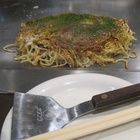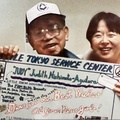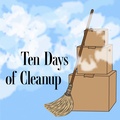“This was just amazing.” Morgan Taketa says after wiping his lips with a cloth napkin that was hand-sewn by my best friend, Risa. He still has a bit of brown okonomiyaki sauce in the corner of his mouth, but I am not going to say anything. Morgan the banker can make my restaurant dreams come true in New York City. He could have come dressed to dinner as the Kentucky Fried Chicken ojiisan and I would have treated him like an emperor.
“So this is your first time to have okonomiyaki?” Risa asks. She has also sewn a prototype apron and hair bandana for me. It is red, of course, as my eatery will be called Red, at least for now. It’s a direct translation of Aka, the original name of my family’s restaurant back in Hiroshima. Not that imaginative, I know. I funnel all my imagination into my food, not words.
“I think I saw Anthony Bourdain eating some on his cable TV show.”
“But that was Osaka style, not Hiroshima.” Risa is quick to correct. She knows my areas of sensitivity.
“Hiroshima style is much, much better,” I tell him. “Layered with noodles. Oishii!”
Morgan laughs. He is what the Japanese would say is kakkoii. With a hakujin mother from Minnesota and a Sansei father, he is very tall, probably over six feet. He has round light-brown eyes and a strong, square jaw. If he walked down the Hondori pedestrian arcade in downtown Hiroshima, girls would certainly take a second look.
“Listen, I have roots in Hiroshima myself,” he says. “My grandfather was from there.”
“Is that true?” For some reason, my heart starts to pound.
“Kao-chan, many of the Nikkei over here are connected to Hiroshima. Many came from our part of Japan.”
I don’t know how Risa became an immigration history expert in such a short time here in New York City. Wasn’t stage design her field, not sociology?
I return back to the okonomiyaki, which I made on a discount electric grill that I bought at Bed Bath & Beyond. “You can also use shrimp and squid, not only pork belly.”
“No, you have to feature the pork belly. This has to be your signature dish.”
“Yes, Kao-chan, this pork belly is very special. So delicious!”
I didn’t have time to tell Risa about my run-in with the butcher in East Harlem. He was as rude as could be—not to mention a Japan-hater. But now that both Morgan and Risa were lavishing such praise on the pork belly, did that mean that I had to make nice with Mr. Deep? And what about my one-star review on Yelp in which I also left a one-word comment. Rotten?
“Kaori?” Morgan interrupts my private worries.
“Oh, excuse me,” I say. “Would you like more mugi-cha?”
I go to Risa’s small refrigerator and remove a plastic container of fresh brewed barley tea.
Risa brings over some dirty dishes to the sink. “It’s going well, isn’t it?” she whispers to me.
Yes, unbelievably yes. My hands even shake as I pour some tea into his glass back at the table.
“Let me crunch some numbers and we can have an official meeting at the bank.” He checks his phone. “Maybe in a couple of days. Wednesday at four o’clock.”
I don’t even pretend to check my phone, because my schedule is wide open. I’ve gotten a US carrier, so now I guess I’m officially a quasi-US resident.
After I give him my new cell phone number, I bow my head a couple of times. “Yes, Wednesday at four.”
* * * * *
Immediately after Morgan leaves, I dig out my phone from my purse. I quickly delete the Yelp review. Maybe he never saw it, I think to myself. But just to make sure that I haven’t completely destroyed my relationship with the Harlem butcher, I realize that I have to return the next day.
When I enter the nondescript building, the butchershop is again not crowded. The butcher—is his name Tom?—is busy cleaning his countertop. I am also meticulous in cleaning my tools and maintaining my grill, so I grudgingly appreciate his attention to cleanliness.
He does not bother to look up. How can he even survive as a businessman?
I finally say, “Hallo.”
He stops his scrubbing and gazes at me. “Oh, so it’s you,” he says. “How was your okidoki?”
“What? Oh, you mean okonomiyaki? It was delicious. The pork belly was superb.” Maybe I can win him over with compliments, I figure. “I may need more every week.”
“Oh really.” Tom tosses a rag on the surface of the counter. “What is your name, by the way?”
“Ah, Kaori.”
“What a coincidence. Because someone named Kaori1990 decimated my shop on Yelp yesterday.”
I grit down on my teeth. Yes, I was foolish enough to register on Yelp under my real name and birth year. I am definitely not equipped to be a covert agent. “I erased it,” I tell him.
“But ‘rotten?’ That’s the worst thing that you can say about a place that sells meat.”
I go to the framed writing on the wall. “But it is written right here.” I point to the word.
“It’s a poem. But then I don’t expect a shallow Japanese girl like you to understand the depth of Langston Hughes.”
“That is rudeness!” I exclaim, forgetting that I need to win the butcher over, not insult him.
“Rudeness?”
I hesitate for a moment, doubting my English proficiency. “I know that is a word.”
“Not used in this context. Rude is fine.”
“Then rude. You are RUDE!” I say. “And I do not need your pork belly. No matter how delicious my banker says it is. Who cares if I now have no chance of success in New York City?!! I should not have erased that review. In fact, I will put it back!”
I then stare at the butcher, expecting him to have the same vile expression that is probably on my face. Instead he is smiling widely with brilliant white teeth.
This is not a humorous matter! I think to myself. “You and your Mr. Hughes can die.” I cannot believe what I am saying. I am known for my short temper, but even this is beyond my usual behavior. And directed toward a stranger.
“Well, Langston Hughes is dead, so he beat you to it. But as for me, I’ll be around, a lot longer than your okidoki will be.”
“Okonomiyaki!” I yell and then stomp out of the shop.
I don’t know what has gotten into me. I know that I should immediately apologize. My phone then buzzes with a text. It’s from Morgan Taketa, the banker. The way things are going, I expect him to tell me that the whole deal is off. But instead, the message completely catches me off-guard.
Thank you for last night.
Free tonight for drinks?
No business talk.☺
© 2017 Naomi Hirahara





